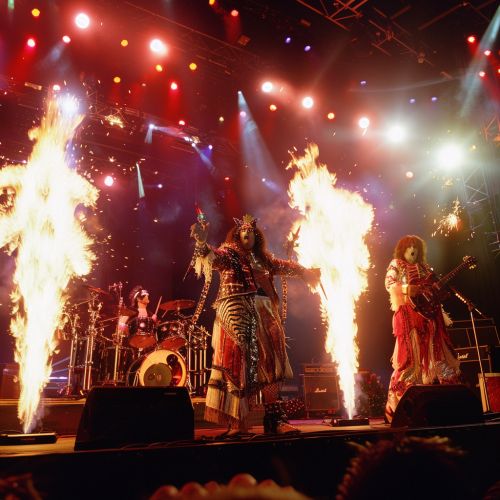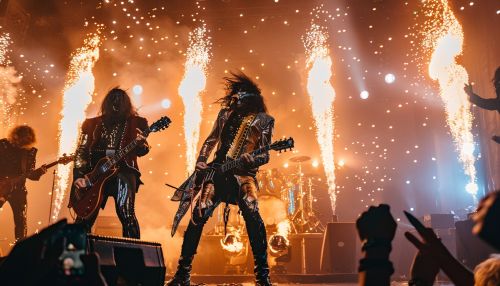Shock Rock
Introduction
Shock rock is a subgenre of rock music that combines rock and roll with theatrical and often controversial performances. This genre is characterized by its use of shocking imagery, stage antics, and provocative themes to captivate and sometimes disturb audiences. The term "shock rock" was first coined in the late 1960s and early 1970s, but its roots can be traced back to earlier rock and roll performances that pushed the boundaries of social norms.
Historical Background
Early Influences
The origins of shock rock can be traced to the early days of rock and roll, where performers like Elvis Presley and Jerry Lee Lewis introduced elements of rebellion and sexuality into their acts. However, it was Screamin' Jay Hawkins who is often credited with pioneering the shock rock genre. His 1956 hit "I Put a Spell on You" featured macabre stage props and theatrical performances that were considered shocking at the time.
1960s and 1970s
The late 1960s and early 1970s saw the emergence of artists who would become synonymous with shock rock. Alice Cooper, born Vincent Furnier, is one of the most notable figures in this genre. His stage shows often included guillotines, electric chairs, fake blood, and boa constrictors. Alice Cooper's blend of horror and rock music set the template for future shock rock acts.
Another significant figure during this period was Arthur Brown, known for his hit single "Fire" and his flamboyant stage presence, which included wearing a burning helmet. KISS, with their elaborate costumes, makeup, and pyrotechnics, also contributed to the development of shock rock, although their music leaned more towards glam rock.
Key Characteristics
Theatrical Elements
Shock rock performances are known for their theatricality. This includes elaborate stage sets, costumes, and props designed to create a visually arresting experience. The use of horror-themed imagery, such as fake blood, skeletons, and other macabre elements, is common. These performances often draw inspiration from horror films, vaudeville, and grand guignol theater.
Provocative Themes
The lyrics and themes in shock rock songs often explore taboo subjects, including death, violence, and sexuality. This is done to provoke a reaction from the audience and to challenge societal norms. The use of controversial themes has led to shock rock being the subject of censorship and criticism from various groups.
Audience Interaction
Shock rock performances often involve a high level of audience interaction. This can include direct engagement with the crowd, such as throwing objects or stage diving. The goal is to create a sense of unpredictability and excitement, making each performance unique.


Notable Artists and Bands
Alice Cooper
Alice Cooper is often referred to as the "Godfather of Shock Rock." His influence on the genre is immense, with his theatrical performances setting a new standard for live rock shows. Cooper's use of horror imagery and stage props has become iconic, and his music continues to inspire new generations of shock rock artists.
KISS
KISS, formed in 1973, is known for their elaborate stage shows featuring pyrotechnics, blood-spitting, and fire-breathing. Their distinctive makeup and costumes have made them one of the most recognizable bands in rock history. While their music spans various genres, their live performances are quintessential shock rock.
Marilyn Manson
Marilyn Manson emerged in the 1990s as a controversial figure in shock rock. His performances often include disturbing imagery, such as self-mutilation and grotesque costumes. Manson's music and persona have sparked significant controversy and debate, making him one of the most polarizing figures in modern rock.
GWAR
GWAR is a band known for their elaborate science fiction-themed costumes and graphic stage performances. Formed in the 1980s, GWAR's shows often feature mock battles, decapitations, and other violent acts, all performed with a sense of dark humor. Their over-the-top theatrics have earned them a dedicated fan base.
Cultural Impact
Influence on Other Genres
Shock rock has had a significant influence on various other genres, including heavy metal, punk rock, and industrial music. Bands like Rob Zombie and Slipknot have incorporated elements of shock rock into their performances, blending horror-themed visuals with aggressive music.
Controversy and Censorship
Due to its provocative nature, shock rock has often been the target of censorship and criticism. Artists like Alice Cooper and Marilyn Manson have faced bans and protests from various groups who view their performances as morally objectionable. Despite this, shock rock has persisted as a form of artistic expression that challenges societal norms.
Legacy
The legacy of shock rock is evident in the continued popularity of theatrical rock performances. Modern artists continue to draw inspiration from the pioneers of the genre, pushing the boundaries of what is considered acceptable in live music. The genre's emphasis on visual spectacle and provocative themes ensures that it remains a dynamic and evolving form of entertainment.
